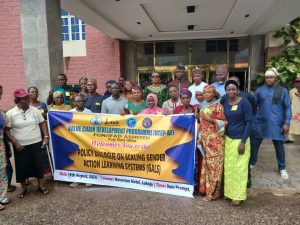
The FGN/IFAD Value Chain Development Programme (VCDP-AF), has organised policy dialogue on scaling-up Gender Action Learning Systems (GALS), aimed to promote gender transformative and empowerment in agricultural value chains and other spheres of life

Speaking at the program on Monday in Lokoja, Dr Fatima Aliyu, the National Coordinator of IFAD-VCDP, described GALS as a household methodology that helps achieve gender-transformative results in IFAD’s operations.
Aliyu, who was represented by Mrs Vera Onyeaka-Onyilo,
Knowledge Management Communication Advisor (KMCA), IFAD-VCDP, said the policy dialogue was to bring together stakeholders to discuss how to scale up GALS in Kogi State, to build on lessons from other states and countries.
“By scaling up GALS, the initiative aims to enhance women’s participation and benefits in agricultural value chains, boost productivity, and ultimately contributing to gender equality and poverty reduction,” she said
She stressed that the GALS methodology has transformed the lives of not only the women and children but as well as men in general
According to her, the GALS methodology has impacted the family & relationships, resource management, shared responsibilities, livelihoods and enable the people to work together as a team, and have vision for their families.
Aliyu emphasised that the program would bring about unity and family cohesion between husband and wife as well as their children and their entire well-being.
In his remarks, the State Commissioner for Agriculture and Food Security, Mr Timothy Ojomah, commended the VCDP for the initiative, saying it has enormously impacted the lives of the benefiting farmers in the state.
The commissioner stressed that VCDP impacts on the farmers have in turn boosted the economic values of the state and enhanced food security.
“No matter how great and impactful food is in the family without a corresponding peace the impact will be meaningless, therefore the GALS methodology in Kogi is welcome development,” he said.
He, therefore urged the participants and all other relevant stakeholders to work together to utilize the acquired knowledge from the program to improve their well-being and the society at large.
Earlier, the State Coordinator of IFAD-VCDP, Dr Stella Adejoh, said VCDP has over the past three and half years impacted greatly on the lives of farmers across the five benefitting local government areas of Kogi State.
According to her, the VCDP is supporting farmers in the value chains of rice and cassava production in Lokoja, Ibaji, Ajaokuta, Kabba-Bunu and Olamaboro LGAs.
Dr Adejoh explained that the policy dialogue was meant to bring all stakeholders together and faction out the best for the people of the state, adding that the GALS was introduced to promote harmonious relationships among families.
“The GALS is a new model for gender relationship for both women and men where general principles of human rights are integrated progressively into real life as natural thing in an interesting and lively format.
“The unique model of GALS is that it is a community led empowerment methodology that promote harmonious and violence-free relationship in families and communities.
“It is aim at connecting and building synergies between various groups of people in pursuit of common vision to avoid gender based violence (GBV),” Adejoh said.
The SPC commended the Kogi State Government for its full support for all the VCDP activities over the past three years in the state.
She stressed that the GALS methodology had achieved great results across the five benefitting local government areas of the state.
Also speaking, the Chief of Ikin-Makun Kupa kingdom, Dr Ndagi Adamu, who was represented by Engr. Mustapha Abdullahi, commended the VCDP for the initiative, stressing that it would promote peaceful coexistence in the society.
A participant, Eunice Abimbola Agbogun, the Executive Director, Challenge Parenthood Initiative (CPI); commended the VCDP for the initiative describing it as a timely intervention.
Agbogun stressed that the GALS initiative would effectively address the issues surrounding gender inequality and GBV in the state.
She commended the the government for engaging non governmental organisations in its implementation and other women empowerment programmes in the state.
She, however urged the government to extend the initiative to other local government areas of the state.
Another participants, High Chief Stephen Salawu, said the program has enlightened and build their capacity on gender issues which involved both women and men.
Participants at the policy dialogue include: the NGOs, policy makers, farmers, traditional and religious leaders, men, women, youths, among others.
